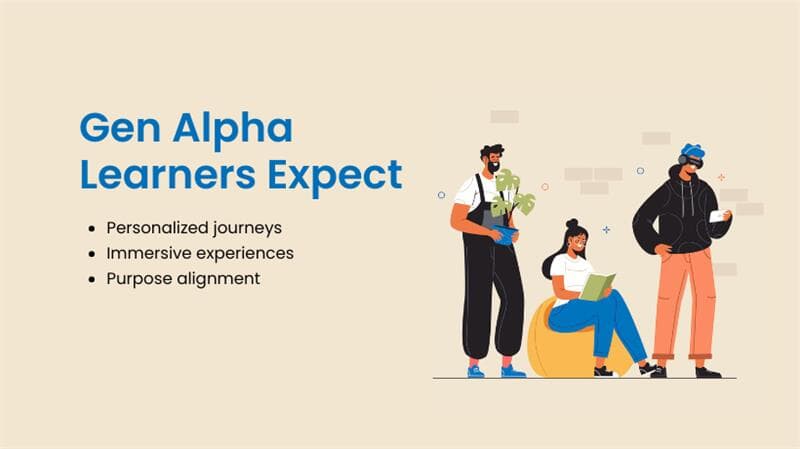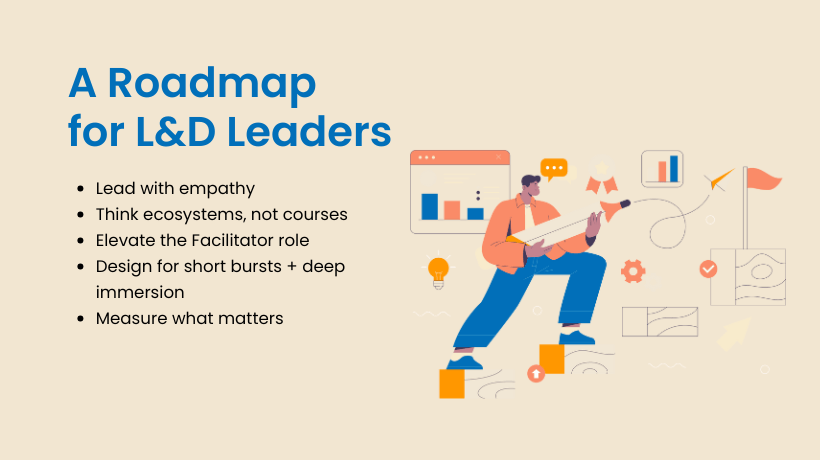The Workforce Of Tomorrow Is Currently Here
Think of onboarding a staff member who has actually never ever recognized a globe without AI. By the mid- 2030 s, Generation Alpha (birthed 2010– 2024 will certainly go into the labor force, adhered to by Generation Beta. These workers will certainly not simply be “digital locals” like the millennials or Gen Z. They will be AI-first learners raised on individualized feeds, immersive settings, and immediate access to details.
Standard mixed learning designs (classroom plus eLearning) will certainly not prepare these generations for the speed, complexity, and purpose-driven assumptions of the future work environment. What is needed is a new roadmap for blended knowing– one that is adaptive, immersive, and deeply human-centered.
The Generational Change: From Digital To AI-First
Research by McKinsey (2024 and Deloitte (2023 suggests that Gen Alpha staff members will certainly focus on learning ecological communities that mirror their electronic lives: vibrant, customized, and always-on.
Unlike Gen Z, that still straddle analog and digital, Gen Alpha will anticipate:
- Customized trips– Customized like Netflix referrals.
- Immersive experiences– AR/VR as all-natural as Zoom calls.
- Purpose alignment– Training that connects skills to bigger social and business effect.

Photo by CommLab India
For L&D, this indicates the really definition of mixed discovering must advance from mixing distribution styles to mixing modern technology, human mentorship, and objective into one seamless experience.
Motif 1: AI-Powered Personalization
Case Instance: Deloitte’s Adaptive Discovering Pilots
Deloitte’s U.S. operations piloted adaptive compliance training in 2023, where AI changed content problem in real time. Workers finished components 25 % faster with greater retention contrasted to static eLearning.
Obstacle: Over-Automation And Privacy
Counting exclusively on formulas risks depersonalizing understanding. Issues around information personal privacy and AI predisposition are expanding, specifically in the EU under GDPR. Workers might resist if personalization feels intrusive.
Option: Human-In-The-Loop Customization
The future design is AI-curated, human-guided:
- AI suggests finding out courses.
- Supervisors and instructors verify, contextualize, and include human nuance.
- Learners co-create their trip, making sure company and count on.
For L&D leaders, this indicates spending not simply in platforms however in administration structures for ethical personalization.
Style 2: Immersive And Experiential Knowing
Situation Example: Accenture’s virtual reality Onboarding
Accenture onboarded 150, 000 new hires in 2022 making use of a virtual university. Staff members produced avatars, participated in city center in VR, and practiced client conversations in simulations. Internal reports showed 60 % higher engagement and decreased time-to-productivity.
Obstacle: Scalability And Price
Full virtual reality releases are pricey and might not scale across locations or features. Equipment injustice remains a barrier, as numerous employees lack accessibility to headsets.
Service: AR-Lite And ROI-Based Fostering
L&D leaders can scale immersion without damaging budget plans by:
- Utilizing AR-lite simulations on mobile devices.
- Releasing virtual reality in high-stakes areas (safety and security, medical care, management).
- Determining ROI rigorously; connecting immersive training to KPIs such as minimized mistake rates or faster onboarding.
The lesson? Immersive discovering needs to be critical, not stylish.
Style 3: Purpose-Driven And Human-Centered Layout
Instance Instance: Microsoft’s Sustainability Leadership Program
In 2023, Microsoft piloted mixed management training where individuals learned ESG frameworks, participated in sustainability simulations, and then made influence projects for their groups. Completion prices surpassed 90 %, and participants reported stronger positioning with firm function.
Challenge: Avoiding “Function Laundering”
Gen Alpha will see through surface initiatives. If training claims to attach to social influence yet feels tokenistic, interaction will fall down.
Solution: Support In Quantifiable Results
Corporate training should tie purpose to service and social results:
- Link sales enablement training to customer value production.
- Attach leadership programs to ESG objectives.
- Develop metrics for influence (e.g., lowered carbon impact via actions adjustment).
For L&D, this is a change from “expertise transfer” to “objective transfer.”
Challenges Of Blended Discovering For Alpha/Beta
- Equity of accessibility: Not every worker will have virtual reality headsets or stable transmission capacity. Offer multi-tier distribution: mobile-first content, offline modules, text-based AI chatbots.
- Information overload: Students may turn down company training if it takes on the details flooding of their electronic lives. Curate with accuracy playlists as opposed to enormous content libraries.
- Instructor and supervisor resistance: Several trainers are still awkward with TikTok-like microlearning or AI-driven platforms. Release facilitator upskilling programs in electronic pedagogy and AI fluency.
- Tech fatigue: Overreliance on glossy systems leads to exhaustion. Reintroduce human anchors– trains, advisors, colleagues– as counterbalance.
A Roadmap For L&D Leaders

Photo by CommLab India
1 Lead With Compassion
Conduct learner ethnographies– meetings, observations, digital journals– to understand exactly how young employees find out outside work. Style as necessary.
2 Assume Communities, Not Rushes
Relocate from “program magazines” to learning ecosystems that blend modalities: AI tutors, VR labs, peer understanding, mentorship, and performance support.
3 Boost The Facilitator Function
Fitness instructors need to evolve right into finding out community supervisors, curating, leading, and regulating instead of simply supplying.
4 Design For Short Ruptureds And Deep Immersion
Blend 90 -2nd pushes with deep-dive workshops. Gen Alpha flourishes in split learning rhythms.
5 Procedure What Issues
Exceed conclusions. Track:
- Involvement– Peer payments, cooperation quality.
- Influence– Efficiency KPIs, advancement results.
- Purpose alignment– Links to ESG or business objectives.
CommLab India’s Lens: Thought Management Insights
From 25 years of creating mixed understanding at range, we know that successful models are never “plug-and-play.” They require:
- Contextualization– Global ideal methods adjusted to business society.
- Speed with top quality– Rapid design powered by AI without shedding instructional deepness.
- Human-centered strategy– Innovation as an enabler, not the driver.
These principles, while not proprietary, reflect what has actually regularly worked throughout Lot of money 500 customers and are essential as L&D leaders plan for Gen Alpha and Beta.
Towards A Smooth Continuum
Blended knowing for Gen Alpha and Beta is not a question of if but how quickly. As McKinsey (2024 noted, firms that rewire their understanding communities around personalization, immersion, and purpose will surpass peers in ability retention and technology.
The roadmap is clear:
- AI-curated, human-guided personalization.
- Immersive, ROI-driven experiences.
- Purpose-anchored layout that develops both abilities and definition.
For L&D leaders, the call is urgent. By the time Gen Beta enters the workforce, “combined” will no more imply blending classroom with eLearning. It will imply a seamless continuum of human and digital, objective and play, knowledge and action.
